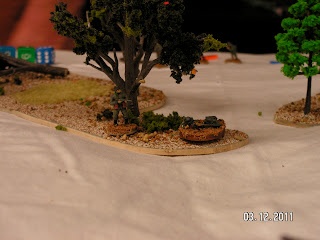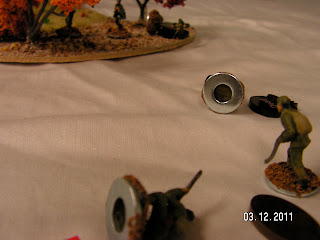The retreat from the Don had cost many lives not due to the constant Russian attacks but to the freezing temperatures that swept over the Russian landscape. The night before our little mix of Italians and Germans found a hamlet of two houses that were unoccupied, so we occupied them. The inhabitants didn't leave much but crumbs but we greedily ate what was left. Our little force was comprised of 2 Italian squads, a German squad and three tanks. All of our heavy weapons found themselves at the side of the road as weakness and the need for speed made them to cumbersome to carry. It was the first night in many where we slept indoors. Some had to sleep outside due to the constant threat of a Russian attack but I was lucky and had some warmth. All night there was a light snow falling which made visibility obscured.
To conserve fuel our tanks turned off their engines knowing full well they may never start again. We all dreamt of home that night.
As the early morning sun rose the slight rumblings of Russian artillery could be heard in the distance. We prayed that their attack would be on some other group. Our luck ran out that morning. A t34 rolled into the hamlet from the east and was able to get off a shot at our strum before the TC could get his tank turned. Luckily, the Russian shell bounced and the TC was able to back his tank out of the line of fire.
The hamlet jumped up to the sound of the tank fire and the our Semovente roared to life and started to move towards the attacking Russians. The Russians, in a total disregard for the peasant housing, fired a round at the house I and my squad were occupying. Luckily the house stood firm but the round wounded 3 of men and stunned both me and my corporal.
The German TC in the PzIV couldn't get his tank to function as the fight continued to build. The Russian t34 went around to his left in an attempt to out flank the Strum. The Russian infantry continued their slow advance expecting our troops to be hiding in the trees. Not realizing we had chosen warmth, instead of a solid defense.
The TC of the Strum threw a track attempting to position himself better and the t34 moved up along his flank and fired. The shot stunned the TC and killed the rest of the crew. The strum sat burning.
Our Semovente rolled forward and lined up for a shot at the t34 and fired. The t34 blew up killing the crew. The PzIV finally swung into action and was now facing the blazing t34.
Our infantry hugged the ground waiting for the tank shells to stop flying since we didn't have anyway of stopping the tanks. We waited for the infantry. The Russians had out flanked us in the night.
Another Russian t34 and infantry squad rolled up on rear. Before the PzIV TC had a chance to react his tank was a blaze with all crew dead.
The German squad occupying the house next to the burning PzIV opened fire on the advancing infantry. It would be their last shots as the t34 reloaded and destroyed the house killing 5 men inside.
The semovente moved in a wide arc in an attempt to flank the t34.
That would his last heroic action as the t34 opened fire killing the crew. The Russian infantry began to advance with more confidence with our tanks burning but they found out that we were not going down without a fight.
Our troops fought valiantly against the Russian hordes but soon causalities started to take their toll.
What soon sealed our fate was another t34 with infantry support rolling up our other flank. Realizing our plight we began to scatter in all directions to save ourselves for another day.
Out numbered some chose to surrender in the hopes they would get a hot meal and some warmth, me and my corporal hid in a snow bank until dark and crept away like field mice. That morning in the Russian hamlet will always haunt my dreams but I am lucky to be alive and warm.
Editors note:
We used the Nuts! rule system for this battle. This was a tough battle for the Italians and Germans. They had no way of knowing where the Russians would attack from and when each of the forces would arrive. The idea for this scenario came from the book "Sergeant in the Snow" written by an Italian sergeant who survived the long retreat out of Russia.



































